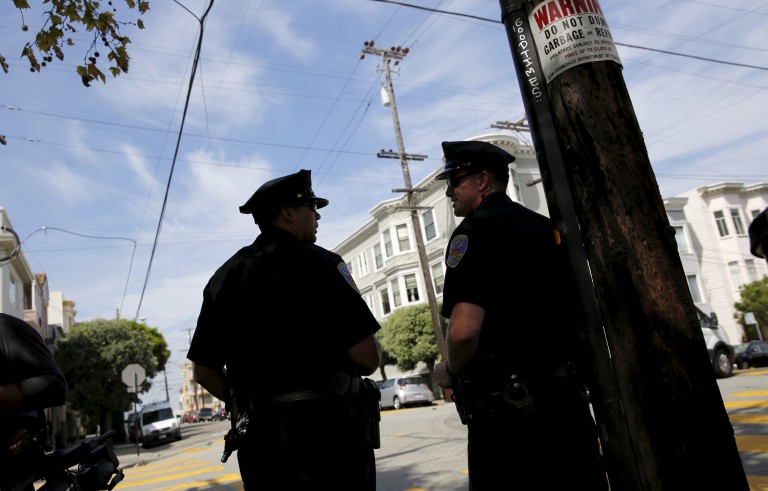(单词翻译:单击)
GWEN IFILL: But, first, more on the continuing debate over police departments and the disputed use of force.
Yesterday, the Department of Justice announced it will review the conduct of the San Francisco Police Department. It comes after the fatal shooting of Mario Woods, a 26-year-old African-American man, in December.
Police said Woods was brandishing a knife and less lethal methods had failed to stop him. But cell phone video has cast doubt on the police claims. Our colleagues at public station KQED cobbled together two cell phone videos taken of the shooting, first in real time, and then slowed down.
A warning: This does contain violent gunfire.
WOMAN: Oh, my God!
GWEN IFILL: Hari Sreenivasan has more from New York on the efforts to change police departments and behavior.

HARI SREENIVASAN: In San Francisco's case, the city voluntarily asked the federal government to do the review, but there have been many other investigations and settlements with the federal government that are not undertaken voluntarily.
Frontline, along with The Washington Post, have looked at how those have worked in cities like Los Angeles and Detroit.
Sarah Childress is a digital reporter for Frontline who has worked on this project, including an in-depth interactive called Fixing the Force.
She joins us now from Boston.
So, Sarah, San Francisco's case is a little abnormal, in considering the investigations that you have launched, but — because they're doing this of their own accord.
SARAH CHILDRESS, "Frontline": That's right.
This is actually a separate process from what the Justice Department calls its pattern of practice of investigations, where they investigate a department and then compel them to implement reforms. This is what — it's under a separate office in the Justice Department, and it's called their collaborative review process.
And they — so the Justice Department does conduct investigation, a review, but then they recommend reforms, and it's up to the departments to decide whether or how to implement them. And that's what's happening in San Francisco.
So, there will be no binding agreement and no — the Justice Department won't be able to sue the department if they don't actually implement reforms.
HARI SREENIVASAN: Now, we hear about these investigations oftentimes because of very high-profile abuse of force or something that kind of makes the news.
But, as you point out, these investigations have been going on for quite some time.
SARAH CHILDRESS: That's right.
The Justice Department has been investigating police departments since 1994, when they first got the authority to do so. So there's been about 68 investigations in that time. This collaborative reform process, though, is pretty new. It's only been — they started it back in 2011. And so there has only been about seven departments that have gone through this process.
And so it's difficult to tell how it works. Actually, only one department, the Las Vegas Metropolitan Police Department, has actually finished the entire reform process under this collaborative review process. So it's difficult to say how effective it will be.
HARI SREENIVASAN: Given the amount of time and money the Justice Department along with the local police agencies are spending, are these plans working?
SARAH CHILDRESS: Well, it's a great question.
And it's really hard to say. We spent several months investigating this with The Washington Post, and we found pretty mixed results. In a lot of cases, officers get better training, better equipment, and certainly they become more professional, but in terms of actually changing how those officers are policing, whether it's changing — reducing use of force, for example, reducing the amount of time citizens are filing complaints, that was much more difficult to tell.
Most of these agreements, when they're court-enforced, it's at least a five-year process. I mean, look, transforming a police department takes a lot of time. It's a lot of money. And it's a lot of effort. So you can't just do these things overnight.
And so I know that activists, when they talk about reforms, they want to see progress right away. And with these sorts of long-term investigations and reform process, that usually isn't the case.
HARI SREENIVASAN: As you pointed out, this also not just takes time, but it takes money. And a lot of these things don't exactly end exactly at the end of year two or year five. So who foots the bill?
SARAH CHILDRESS: Well, it's up to the cities. And they're responsible for paying for all of these reforms.
There is a process by which they can apply for grants, and sometimes the Justice Department will provide technical assistance or other help, but it's really up to the cities. You know, and, in some cases, these can cost millions, especially with larger departments. If you're implementing new training, new equipment, hiring additional staffing, you know, it's — in the case of Los Angeles, which was one of the longest-running reform process, over a decade, it cost an estimated $300 million.
You know, that's a lot of money.
HARI SREENIVASAN: Are there any metrics that measure outcomes? Is there less abuse of force after one of these interventions?
SARAH CHILDRESS: Well, that's a great question.
And that's one we actually tried to answer in our investigation with The Washington Post. And we came up with mixed results. In some cases, departments definitely were using less force. Officers were better trained. And they were — departments were better able to investigate incidents, officer-involved shootings.
But, in other cases, the data was really mixed. There isn't a national standard on use of force, so it's really difficult to compare a department to a department, or even within the department, once the Justice Department comes in and starts changing how they report use of force.
So the short answer is, it's hard to say. We really don't know yet.
HARI SREENIVASAN: All right, Sarah Childress from "Frontline," thanks so much for joining us.
SARAH CHILDRESS: Thanks for having me.


